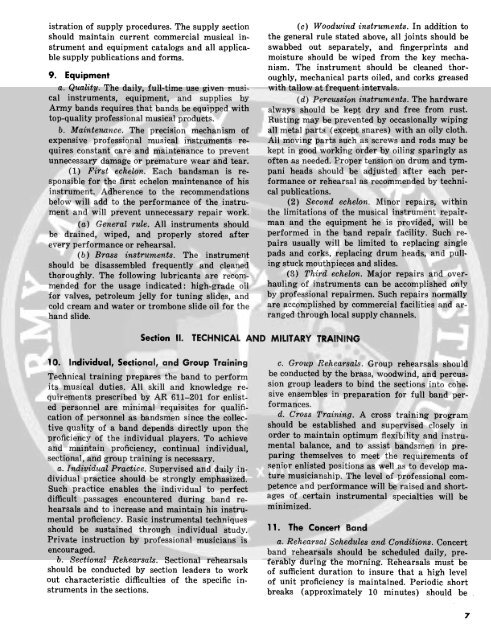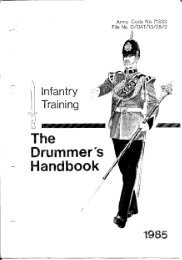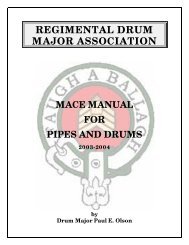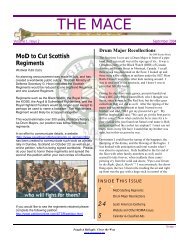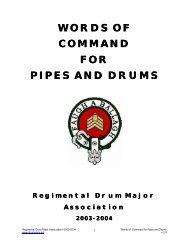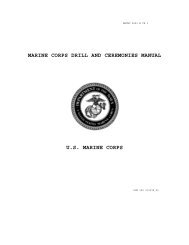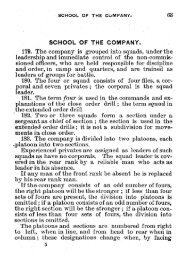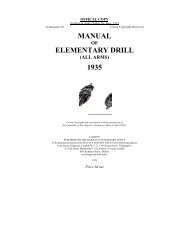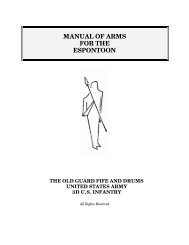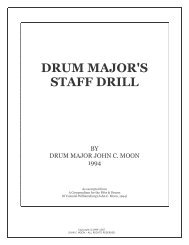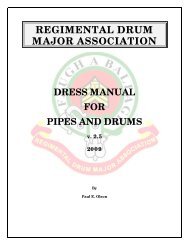The Military Band - Regimental Drum Major Association
The Military Band - Regimental Drum Major Association
The Military Band - Regimental Drum Major Association
You also want an ePaper? Increase the reach of your titles
YUMPU automatically turns print PDFs into web optimized ePapers that Google loves.
istration of supply procedures. <strong>The</strong> supply section (c) Woodwind instruments. In addition to<br />
should maintain current commercial musical in- the general rule stated above, all joints should be<br />
strument and equipment catalogs and all applica- swabbed out separately, and fingerprints and<br />
ble supply publications and forms. moisture should be wiped from the key mechanism.<br />
<strong>The</strong> instrument should be cleaned thor-<br />
9. Equipment oughly, mechanical parts oiled, and corks greased<br />
a. Quality. <strong>The</strong> daily, full-time use given musi- with tallow at frequent intervals.<br />
cal instruments, equipment, and supplies by (d) Percussion instruments. <strong>The</strong> hardware<br />
Army bands requires that bands be equipped with always should be kept dry and free from rust.<br />
top-quality professional musical products. Rusting may be prevented by occasionally wiping<br />
b. Maintenance. <strong>The</strong> precision mechanism of all metal parts (except snares) with an oily cloth.<br />
expensive professional musical instruments re- All moving parts such as screws and rods may be<br />
quires constant care and maintenance to prevent kept in good working order by oiling sparingly as<br />
unnecessary damage or premature wear and tear. often as needed. Proper tension on drum and tym-<br />
(1) First echelon. Each bandsman is re- pani heads should be adjusted after each persponsible<br />
for the first echelon maintenance of his formance or rehearsal as recommended by techniinstrument.<br />
Adherence to the recommendations cal publications.<br />
below will add to the performance of the instru- (2) Second echelon. Minor repairs, within<br />
ment and will prevent unnecessary repair work. the limitations of the musical instrument repair-<br />
(a) General rule. All instruments should man and the equipment he is provided, will be<br />
be drained, wiped, and properly stored after performed in the band repair facility. Such reevery<br />
performance or rehearsal. pairs usually will be limited to replacing single<br />
(b) Brass instruments. <strong>The</strong> instrument pads and corks, replacing drum heads, and pullshould<br />
be disassembled frequently and cleaned ing stuck mouthpieces and slides.<br />
thoroughly. <strong>The</strong> following lubricants are recom- (3) Third echelon. <strong>Major</strong> repairs and overmended<br />
for the usage indicated: high-grade oil hauling of instruments can be accomplished only<br />
for valves, petroleum jelly for tuning slides, and by professional repairmen. Such repairs normally<br />
cold cream and water or trombone slide oil for the are accomplished by commercial facilities and arhand<br />
slide. ranged through local supply channels.<br />
Section II. TECHNICAL AND MILITARY TRAINING<br />
10. Individual, Sectional, and Group Training c. Group Rehearsals. Group rehearsals should<br />
Technical training prepares the band to perform be conducted by the brass, woodwind, and percusits<br />
musical duties. All skill and knowledge re- sion group leaders to bind the sections into cohequirements<br />
prescribed by AR 611-201 for enlist- sive ensembles in preparation for full band pered<br />
personnel are minimal requisites for qualifi- formances.<br />
cation of personnel as bandsmen since the collec- d. Cross Training. A cross training program<br />
tive quality of a band depends directly upon the should be established and supervised closely in<br />
proficiency of the individual players. To achieve order to maintain optimum flexibility and instruand<br />
maintain proficiency, continual individual, mental balance, and to assist bandsmen in presectional,<br />
and group training is necessary. paring themselves to meet the requirements of<br />
a. Individual Practice. Supervised and daily in- senior enlisted positions as well as to develop madividual<br />
practice should be strongly emphasized. ture musicianship. <strong>The</strong> level of professional com-<br />
Such practice enables the individual to perfect petence and performance will be raised and shortdifficult<br />
passages encountered during band re- ages of certain instrumental specialties will be<br />
hearsals and to increase and maintain his instru- minimized.<br />
mental proficiency. Basic instrumental techniques<br />
should be sustained through individual study. 11. <strong>The</strong> Concert <strong>Band</strong><br />
Private instruction by professional musicians is a. Rehearsal Schedules and Conditions. Concert<br />
encouraged. band rehearsals should be scheduled daily, preb.<br />
Sectional Rehearsals. Sectional rehearsals ferably during the morning. Rehearsals must be<br />
should be conducted by section leaders to work of sufficient duration to insure that a high level<br />
out characteristic difficulties of the specific in- of unit proficiency is maintained. Periodic short<br />
struments in the sections. breaks (approximately 10 minutes) should be<br />
7


